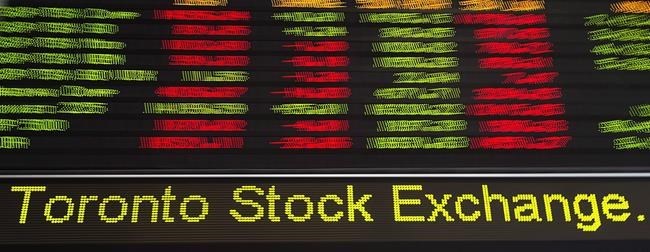TORONTO — North American stock markets broke multi-day losing streaks after the U.S. Federal Reserve adopted the largest interest rate increase since 1994 and vowed to remain aggressive in tackling soaring inflation.
Markets softened until about 2:30 p.m. when Fed chairman Jerome Powell explained the decision to hike its rate by three quarters of a percentage point and hinted at additional sizable increases to come.
“From the perspective of today, either a 50 basis point or a 75 basis point increase seems most likely at our next meeting,” he told reporters.
The Fed projected Wednesday that interest rates will likely end the year at between 3.25 and 3.5 per cent, up from its March estimate of 1.75 to 2.0 per cent.
The S&P/TSX composite index closed up 63.05 points to 19,611.56 after see-sawing through a range of 360 points between the day's high and low.
In New York, the Dow Jones industrial average was up 300.70 points at 30,668.53. The S&P 500 index was up 54.51 points at 3,789.99, while the Nasdaq composite was up 270.80 points or 2.5 per cent at 11,099.15.
Investors had been expecting a 50 basis point increase until Friday, when increasing inflation numbers for May prompted a rethink. About 99 per cent of analysts had raised their forecast to 75 basis points.
Investors reacted positively to the decisive action of the Fed, said Anish Chopra, managing director with Portfolio Management Corp. Critics had previously accused it of not reacting fast enough to tame inflation.
"That's the message to investors — the Fed is willing to act to control inflation," he said in an interview.
Chopra said the central bank showed its flexibility by changing course after initially telegraphing a smaller rate increase.
"And if inflation still continues to rise and they're not comfortable with it, based on their action today, they could have more rate increases and they could still increase the size of those rate increases."
However, Shaun Osborne of Scotiabank said the challenge for central banks is that inflation is mainly driven by higher energy prices (stemming from the Ukrainian war), which are insensitive to monetary policy.
"What policymakers are attempting to do, however, is re-anchor inflation expectations," he wrote in a report.
Chopra said the Fed's decision will put pressure on the Bank of Canada to follow suit at its meeting next month given a similar inflation environment, after increasing rates by half a percentage point in two consecutive meetings.
"If (Bank of Canada governor) Tiff Macklem doesn't raise rates, what will happen is if the U.S. continues to raise rates, the Canadian dollar will fall."
The relative composition of the U.S. and Canadian stock markets largely explained the differing performance midweek. Technology's strength was more supportive of gains south of the border while a weaker energy sector hurt the Toronto market.
Technology rose 2.2 per cent as bond yields fell from their multi-year highs.
As a result, shares of Shopify Inc. increased 6.9 per cent and Lightspeed Commerce Inc. were up 5.7 per cent.
Materials recovered late amid higher metals prices.
The August gold contract was up US$6.10 at US$1,819.60 an ounce and the July copper contract was up less than a penny at US$4.16 a pound.
Health care, consumer discretionary and real estate were among the day's leaders.
Energy and utilities were the lone laggards, with energy falling 1.3 per cent as the largest decrease of crude oil prices in nearly a month hurt producers such as Cenovus Energy Inc., whose shares dripped 3.6 per cent.
The July crude contract was down US$3.62 at US$115.31 per barrel and the July natural gas contract was up 23.1 cents at US$7.42 per mmBTU.
"Energy's had a strong run over the last number of months, and today the decline in the price of oil certainly had an impact on the TSX," said Chopra.
Despite Wednesday's pullback, crude prices are up nearly 53 per cent so far in 2022.
The Canadian dollar traded for 77.23 cents US compared with 77.28 cents US on Tuesday.
This report by The Canadian Press was first published June 15, 2022.
Companies in this story: (TSX:LSPD, TSX:SHOP, TSX:CVE, TSX:GSPTSE, TSX:CADUSD=X)
Ross Marowits, The Canadian Press




